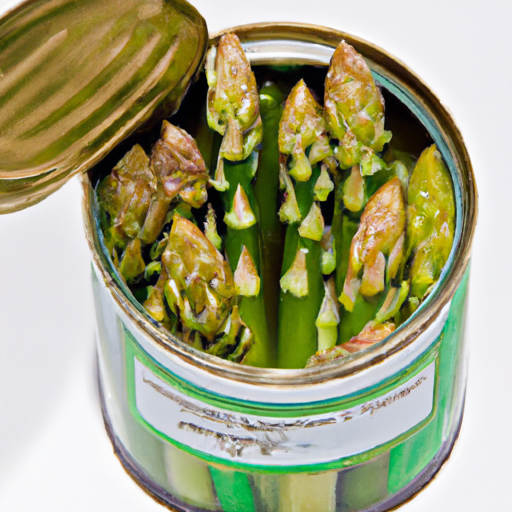Canned Asparagus: A Versatile and Nutritious Addition to Your Pantry
Asparagus, known for its vibrant green color and distinct flavor, is a beloved vegetable that has been enjoyed for centuries. While fresh asparagus is widely available during the spring season, canned asparagus offers a convenient and accessible option year-round. In this blog post, we will explore the wonderful world of canned asparagus, from its taste and common uses in cooking to its nutritional value and fascinating history.
Taste and Texture
Canned asparagus has a unique taste that can be described as slightly tangy with a hint of sweetness. The tender spears maintain their firmness during the canning process, resulting in a delightful crunch when bitten into. While it might not have the same level of crispness as fresh asparagus, the preserved version offers a desirable texture that can enhance a variety of dishes.
Common Uses in Cooking
Canned asparagus is incredibly versatile and can be utilized in various culinary creations. Here are a few popular ways to incorporate this delightful ingredient into your cooking:
Salads: Add a handful of canned asparagus spears to your favorite green salad for an extra burst of flavor and textural contrast. Pair it with tomatoes, feta cheese, and a light vinaigrette to create a refreshing summer salad.
Stir-fries: Stir-frying is a fantastic way to take advantage of canned asparagus. Its well-preserved crispness allows it to retain its shape and texture when cooked at high temperatures. Toss it into your favorite stir-fry with other vibrant vegetables and your protein of choice for a quick and nutritious meal.
Quiches and frittatas: Canned asparagus adds an extra layer of depth to quiches and frittatas. Its distinct flavor blends beautifully with eggs, cheese, and herbs, creating a savory and satisfying dish.
Pasta dishes: Incorporate canned asparagus into pasta dishes such as creamy Alfredo or light lemony pasta. The spears can be added directly to the sauce or served as a garnish, bringing a burst of color and taste to your meal.
Nutritional Value
Canned asparagus not only adds flavor to your dishes but also offers several nutritional benefits. Here’s an overview of its nutritional value:
Vitamins and minerals: Asparagus is an excellent source of vitamins A, C, E, and K. It also contains folate, which plays a vital role in cell development and function.
Fiber: Canned asparagus is a good source of dietary fiber, promoting healthy digestion and aiding in weight management.
Antioxidants: Asparagus is rich in antioxidants, which help protect the body against harmful free radicals and reduce the risk of chronic diseases.
History and Facts
Asparagus has a long and fascinating history dating back to ancient times. Here are a few intriguing facts about this beloved vegetable:
Asparagus was cultivated by the ancient Egyptians over 2,000 years ago. It was highly valued for its delicate flavor and medicinal properties.
Ancient Greeks and Romans not only appreciated asparagus as a delicious food but also believed it had aphrodisiac qualities.
The earliest record of canning asparagus dates back to the 18th century when Napoleon Bonaparte requested it to be preserved for his army. This marked the beginning of canned asparagus as a readily available food option.
Conclusion
Canned asparagus is a versatile pantry staple that can elevate an array of dishes with its unique taste and texture. Whether you’re incorporating it into salads, stir-fries, or pasta dishes, this preserved vegetable is sure to bring a burst of flavor to your meals. With its nutritional value and fascinating history, canned asparagus is a fantastic addition to any kitchen and a delightful way to enjoy this beloved vegetable year-round.
Canned Asparagus
- Origin: Asparagus is native to the eastern Mediterranean and has been cultivated for over 2,000 years. The Romans were known to be avid asparagus cultivators.
- Common Uses: Canned asparagus is commonly used as a convenient and versatile ingredient in various dishes. It can be added to salads, soups, stir-fries, pasta dishes, quiches, and omelets.
- Nutritional Benefits: Asparagus is a nutrient-dense vegetable. Canned asparagus retains some of its nutritional value, including a good amount of fiber, vitamins (such as vitamin A, C, E, and K), and minerals (such as iron and potassium). However, the canning process may cause some loss of heat-sensitive nutrients.
- Unique Properties: Canning asparagus allows it to be stored for long periods, extending its shelf life and preserving its flavor and texture. It is available year-round, making it accessible even when fresh asparagus is out of season. Canned asparagus also tends to retain its shape well, making it suitable for presentations where the appearance of the asparagus is crucial.
- Historical Significance: Asparagus has been celebrated since ancient times for its delicate flavor and medicinal properties. It was highly regarded in ancient Egypt, Greece, and Rome. French King Louis XIV is said to have enjoyed asparagus so much that he had special greenhouses built to have the vegetable available year-round. Asparagus has a rich cultural history and has been enjoyed in various cuisines around the world.




Use the share button below if you liked it.
It makes me smile, when I see it.